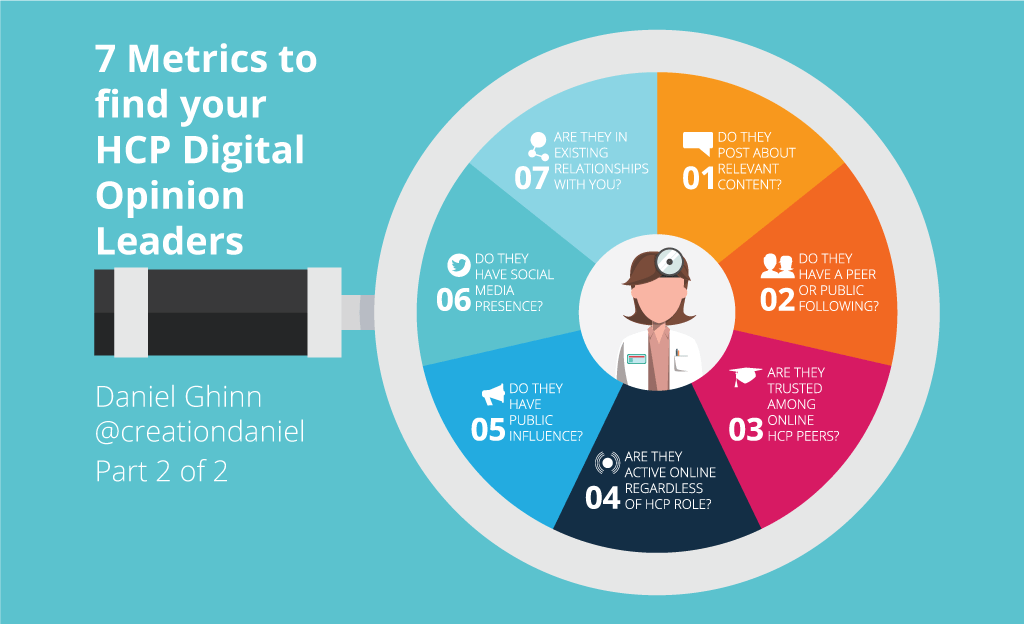Who do you know?
In the first part of this 2-part series, I presented three essential metrics to consider when you are looking for healthcare professional Digital Opinion Leaders: content; HCP peer following; and trust. Having analysed these keys, you will want to know more about the role that an HCP plays professionally and in the public environment of social media.
![]() 4. Are they active online regardless of HCP role?
4. Are they active online regardless of HCP role?
An interesting phenomenon we discovered when we started to analyse the online networks of HCPs, is that the senior specialists traditionally associated with peer influence in the ‘offline’ world are not always the most influential online. These traditional experts – often known in the pharmaceutical industry as ‘Key Opinion Leaders’, ‘Key Thought Leaders’, or ‘Key External Experts’ – are increasingly gaining traction on social media but have largely been slower adopters of digital channels than their younger colleagues.
Indeed, when we speak to doctors about their social media use, some of them tell us that online, they will happily share ideas and learn from professionals in a wider range of other roles and levels of experience than they typically do in their own hospitals.
So when planning a CREATION Pinpoint study, our clients are often interested to learn new things about how different HCP role types are collaborating online. They may also wish to focus on a particular group of HCP roles, to learn about specific needs among groups of professionals and to develop ‘personas’ for informing their future engagement plans.
With this in mind, HCP role can be an important factor to consider in assessing which individuals are the most relevant Digital Opinion Leaders in a study.
 This CREATION Pinpoint map of selected UK pharmacists on Twitter illustrates the close ‘virtual network’ that exists among peers with common professional interests. (Presented at King’s Fund Digital Health & Care Congress 2015)
This CREATION Pinpoint map of selected UK pharmacists on Twitter illustrates the close ‘virtual network’ that exists among peers with common professional interests. (Presented at King’s Fund Digital Health & Care Congress 2015)
![]() 5. Do they have public influence?
5. Do they have public influence?
The metrics discussed above focus on HCP-specific data, available through CREATION Pinpoint’s online HCP profiling technology. In some cases, however, having identified the HCPs who are active in a conversation, their influence in the wider public online conversation should also be considered.
If you are not looking for a Digital Opinion Leader who influences HCP conversations in a niche specialism, it may be helpful to know about the level of an individual’s credibility among the public.
CREATION Pinpoint integrates with data from Kred, an open system providing a score to indicate an individual’s relative influence as the likelihood that someone will trust a person and act upon their posts. A social media user’s Kred score increases when others (not necessarily HCPs) retweet, reply to or follow that user.
![]() 6. Do they have social media presence?
6. Do they have social media presence?
When profiling HCP influencers, a CREATION Pinpoint study considers the breadth of an individual’s public social media channels and activities. Each channel has particular characteristics and may be favoured by HCPs for different kinds of activities. Some HCPs prefer to use just one or two channels, while others engage over a diverse range of social media.
![]() A CREATION Pinpoint HCP profile examines an individual’s use of a diverse range of public social media channel
A CREATION Pinpoint HCP profile examines an individual’s use of a diverse range of public social media channel
Twitter, for example, is usually where we find the greatest number of individual posts among HCPs. Since Twitter limits users to 140 characters per post, or Tweet, one conversation or idea may be presented by many individual posts. If a doctor runs a blog, on the other hand, they may post less frequently but each post is likely to include a rich set of ideas compared with individual Tweets.
When considering HCP Digital Opinion Leaders, it can be helpful to know where they are most active online. If your vision is to collaborate in online engagement, for example, then knowing which Digital Opinion Leaders are active on the channels where you are comfortable could be advantageous.
![]() 7. Are they in existing relationships with you?
7. Are they in existing relationships with you?
While the idea of identifying, profiling and possibly even engaging with an HCP Digital Opinion Leader may seem daunting to some, it need not necessarily be so. A practical place to start may be with your existing relationships: does your CREATION Pinpoint HCP Study identify individuals who you already have a relationship with? Even if they are not the most influential or actively engaged among the HCPs identified in your study, your existing relationship may provide you with an opportunity to learn from them in real life, before you venture online.
On the other hand, you might discover that those HCPs who you know best are not yet actively using social media, or are not influential online. I know of one pharmaceutical company that helped such a ‘Key Opinion Leader’ to get started online by inviting him to collaborate in a public Twitter ‘chat’ about a disease area. In another case, I saw a younger, ‘digital native’ doctor collaborate with a senior expert by posting their content on his blog.
Putting it together
In a healthcare world where we cannot afford to waste time and resources, knowing who to engage online, and how, is crucial for effective engagement. Whether you hope to influence public health policy, to learn about doctors’ needs, or you have important information about new treatments, trusted HCP Digital Opinion Leaders can make or break your effectiveness. Whether you use CREATION Pinpoint to discover new HCP Digital Opinion Leaders in your areas of interest, or to better support existing networks, I hope the metrics above will guide you in your HCP engagement strategy.If you found this article helpful, why not reserve a place on one of our upcoming webinar dates in which I will present more insights on these metrics and answer your questions in a live session.Or to find out more about CREATION Pinpoint right now, watch this two-minute movie.
 By Daniel Ghinn
By Daniel Ghinn 

